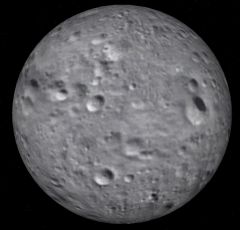Difference between revisions of "Aegir"
Jump to navigation
Jump to search
(Created page.) Tag: Removed redirect |
m (Arvil moved page User:Arvil/Sandbox02 to Aegir: Move to article page.) |
(No difference)
| |
Latest revision as of 03:16, 22 October 2024
Aegir (Saturn XXXVI, S/2004 S 10) is a small, irregular retrograde satellite of Saturn, discovered from images taken from December 2004 to March 2005 by Scott Sheppard and his team. It was named after Ægir, a giant, son of Fornjót, in Norse mythology.
Aegir in Orbiter[edit]
Aegir was introduced to Orbiter with the release of the add-on outer_planets-060929-base.zip as S/2004 S 10.
In outer_planets-060929-base.zip, Aegir was referred to as S2004-S10. In order to use it as Aegir, the following changes must be made.
- File:S2004_S10.cfg:
- change the filename to Aegir.cfg
- change the name in the comment line in the top line to Aegir (S/2004-S10, Saturn)
- line 3, change NAME = to Aegir
- Last line, change the name of S10-Station = to Aegir-station
- File:S10-Station.cfg
- change the filename to Aegir-station.cfg
- Line 3, change the name to Aegir-Station
- File:Saturn_S2004S10.scn
- change the filename to Saturn-Aegir.scn
- Line 2, change S2004-S10 Station to Aegir Station
- Find the GL-01 ship, change STATUS Landed S2004-S10 to Landed Aegir
- Change BASE S10-Station:1 to Aegir-Station:1
- File:S2004-S10.tex, change filename to Aegir.tex
- File:S2004-S10M.BMP, change filename to AegirM.BMP
| Add-on | Source | Version | Author | Type | Release Date | Compatibility | Wiki article |
|---|---|---|---|---|---|---|---|
| The Outer Planets 060929 Base | AVSIM | Rolf Keibel Carl Romanik Tony Dunn |
Scenery | 30 September 2006 | Orbiter 2006-P1 | ||
See also[edit]
Gallery[edit]
| edit The Solar System | |
|---|---|
| Central star |
Sun (Sol) |
| Planets |
Mercury - Venus - Earth - Mars - Jupiter - Saturn - Uranus - Neptune |
| Natural satellites |
Moon - Phobos - Deimos - Io - Europa - Ganymede - Titan - more... |
| Add-ons |
Planets - Dwarf Planets - Small objects - Natural satellites - Alternative star systems |
 | This natural satellite related article is a stub. You can help Orbiterwiki by expanding it.
|

